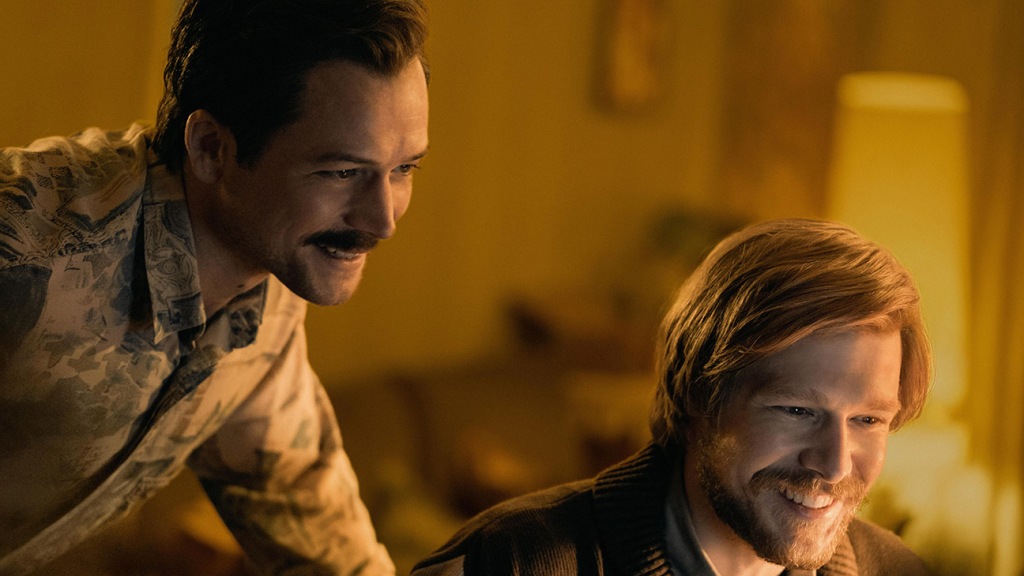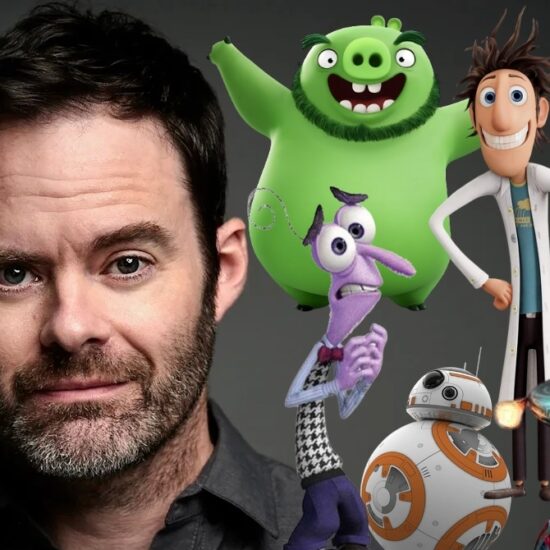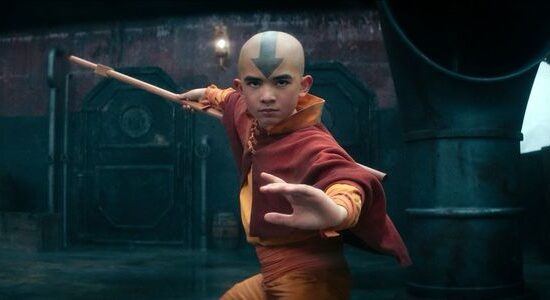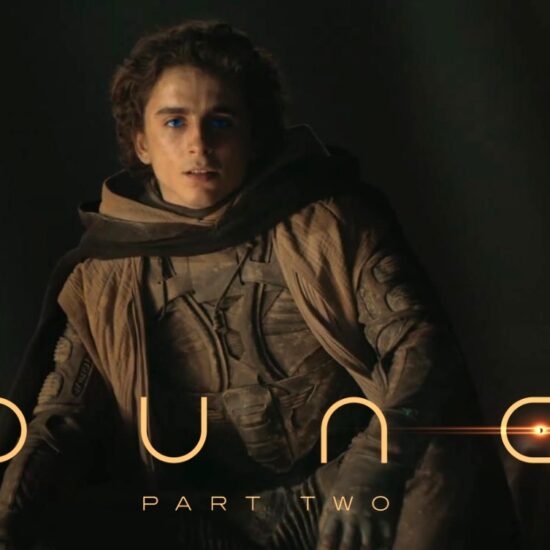
Somewhere along the way in Jon S. Baird’s fleet and compelling fictionalized look at the invention of Tetris, you forget that you’re watching a film about a video game. Zippy car chases, farcical negotiation scenes and a tour of 1980s-era conference rooms around the world make Tetris, which premiered at SXSW and airs on Apple TV+ at the end of March, more than an ordinary origin story. Baird (Stan & Ollie) uses the convoluted licensing battle around the game to frame a sturdy and occasionally funny drama about capitalism, intellectual property and the specter of the Soviet Union’s dissolution. Tetris’ willingness to tackle these themes indeed makes it more absorbing than your average streamer fare, but it also makes you wish the film went farther in exploring its ambivalence about the relationship between creative expression and greed.
The story starts in ’80s Las Vegas, where Henk Rogers (Taron Egerton), a Dutch national raised in New York and living in Japan, is trying to sell his game, Go, at a convention. His efforts to corral passersby are, to put it bluntly, unsuccessful. Not only is Henk competing with the city and its promise of slot-machine riches, but he’s stationed next to a far more gripping game: Tetris. The falling tetriminoes, which must be turned and flipped to create a complete line, have even stolen his salesgirl, who floated to the next station and never returned.
Tetris
The Bottom Line
Enjoyable, as far as it goes.
Venue: SXSW Film Festival (Headliners)
Release date: Friday, March 31 (Apple TV+)
Cast: Taron Egerton, Nikita Efremov, Sofia Lebedeva, Anthony Boyle, Ben Miles
Director: Jon S. Baird
Screenwriter: Noah Pink
Rated R,
1 hour 58 minutes
Like any good businessman, Henk nosily investigates the competition. What he finds just a few feet away is an addictive puzzle game, an enthralling composition of multicolored blocks. He impulsively buys the computer and arcade rights for Japan (a move he clumsily rationalizes to his impatient bank manager, played by Rick Yune).
Everyone who encounters Tetris feels like Henk. The game, invented by Russian computer engineer and game designer Alexey Pajitnov (portrayed by Nikita Efremov) in 1984, was unlike anything on the market at the time. The simple aesthetic and straightforward goal (to create a complete row, which then disappears) drew players in. The brief thrill of incremental problem-solving kept them hooked.
In the 2004 documentary Tetris: From Russia with Love, Pajitnov and a gallery of talking heads attribute the game’s widespread appeal to how it tapped into a more creative part of the human psyche. Tetris inspired you to build something; it was, in Pajitnov’s words in the doc, imbued with the “spirit of constructing.”
I suspect timing also played a large part in the game’s early success. Tetris breached the digital walls of the Iron Curtain as the Soviet Union was on the brink of collapse. The game gained notoriety within Russia and then the rest of the Soviet countries before its license was acquired by Robert Stein (played by Toby Jones), a shrewd businessman who created a market out of shoddy license acquisitions. It linked, however tenuously, people around the world to a place they had been taught to fear.
Tetris efficiently covers this history in its opening moments through Henk’s voiceover narration and expository sales pitch to his bank manager. But Baird is more interested in the bizarre events that subsequently made the game a runaway success internationally and eventually secured a credit for its creator. By truncating the early part of the game’s origin story, the film pushes interesting questions about its underground distribution (Pajitnov copied it for friends, who copied it for other friends, etc.) to the margins.
Baird’s approach is similar to David Fincher’s in The Social Network, another film that uses a protracted legal battle to frame inquiries about greed and capitalism. Like the earlier movie, Tetris, with its dour visual palette, menacing score and jittery camera angles, plays like a thriller. But Baird adds flourishes that save the film from cynicism, most notably the 16-bit animation interludes introducing characters as players and chapters as levels and using Europe’s “The Final Countdown” as a musical motif.
Noah Pink’s screenplay gives us solid enough foundations to understand the motives of each character, but not enough to prevent them from occasionally feeling like avatars. Egerton’s Henk, played with an earnest goofiness, becomes a symbol for integrity and honesty. More than the license for distribution, he wants Efremov’s Alexey, whom he tries to develop a friendship with, to get credit and royalties. The other businessmen, like Robert (Jones) and the billionaire Maxwells (Roger Allam plays shady patriarch Robert and Anthony Boyle is his thin-skinned son, Kevin), couldn’t care less about the inventor.
When Henk lands in Russia, he discovers a system unsympathetic to his Western ideals, and even more vultures. There’s Nikolai Belikov (Oleg Stefan), the manager of Alexey’s company, whose motivations boil down to getting the best deal for the Soviet Union, or so he says. And corrupt KGB officer Valentin Trifonov (Igor Grabuzov) wants to secure a personal safety net before the current regime topples. As the cadre of businessmen convene in Russia (unbeknownst to each other), the stakes get higher and the ridiculousness of their situations more apparent, making for an entertaining sequence of events. Desperate attempts to outbid each other land each of them in wild scenarios as the corrosive mix of money and power in the collapsing Soviet Union becomes clearer.
As Tetris hurtles toward its final act, the film raises more questions about intellectual property, capital and who loses when greed is prioritized above all else. There’s also an attempt to punch up the thread about Henk and Alexey’s friendship — the two have a heart-to-heart dinner and go out dancing — though that doesn’t land as gracefully as the licensing storyline, with its more natural-feeling twists and turns.
Tucked into the film’s triumphant ending are traces of traces of a more provocative thesis about the geopolitical landscape into which Tetris was born. Who were the real winners and losers of this fraught licensing battle unfolding against the backdrop of a changing world order? With Pet Shop Boys’ “Opportunities” — a song steeped in irony — playing over the closing credits, I longed for a film that leaned into complexity as much as sheer enjoyability.
Full credits
Venue: SXSW Film Festival (Headliners)
Distributor: Apple TV+
Production companies: AI-Film, Apple TV+, Marv Films, Unigram
Cast: Taron Egerton, Nikita Efremov, Sofia Lebedeva, Anthony Boyle, Ben Miles, Ken Yamamura, Igor Grabuzov, Oleg Shtefanko, Ayane Nagabuchi, Rick Yune
Director: Jon S. Baird
Screenwriter: Noah Pink
Producers: Matthew Vaughn, Gillian Berrie, Claudia Vaughn, Len Blavatnik, Gregor Cameron
Executive producers: Zygi Kamasa, Carlos Peres, Iain Mackenzie, Noah Pink, Taron Egerton, Danny Cohen, Amanda Ghost, Vince Holden, Henk Rogers, Alexey Pajitnov, Maya Rogers
Cinematographer: Alwin Kuchler
Production designer: Daniel Taylor
Costume designer: Nat Turner
Editors: Martin Walsh, Colin Goudie, Ben Mills
Music: Lorne Balfe
Casting director: Lillie Jeffrey, Reg Poerscout-Edgerton
Rated R,
1 hour 58 minutes













